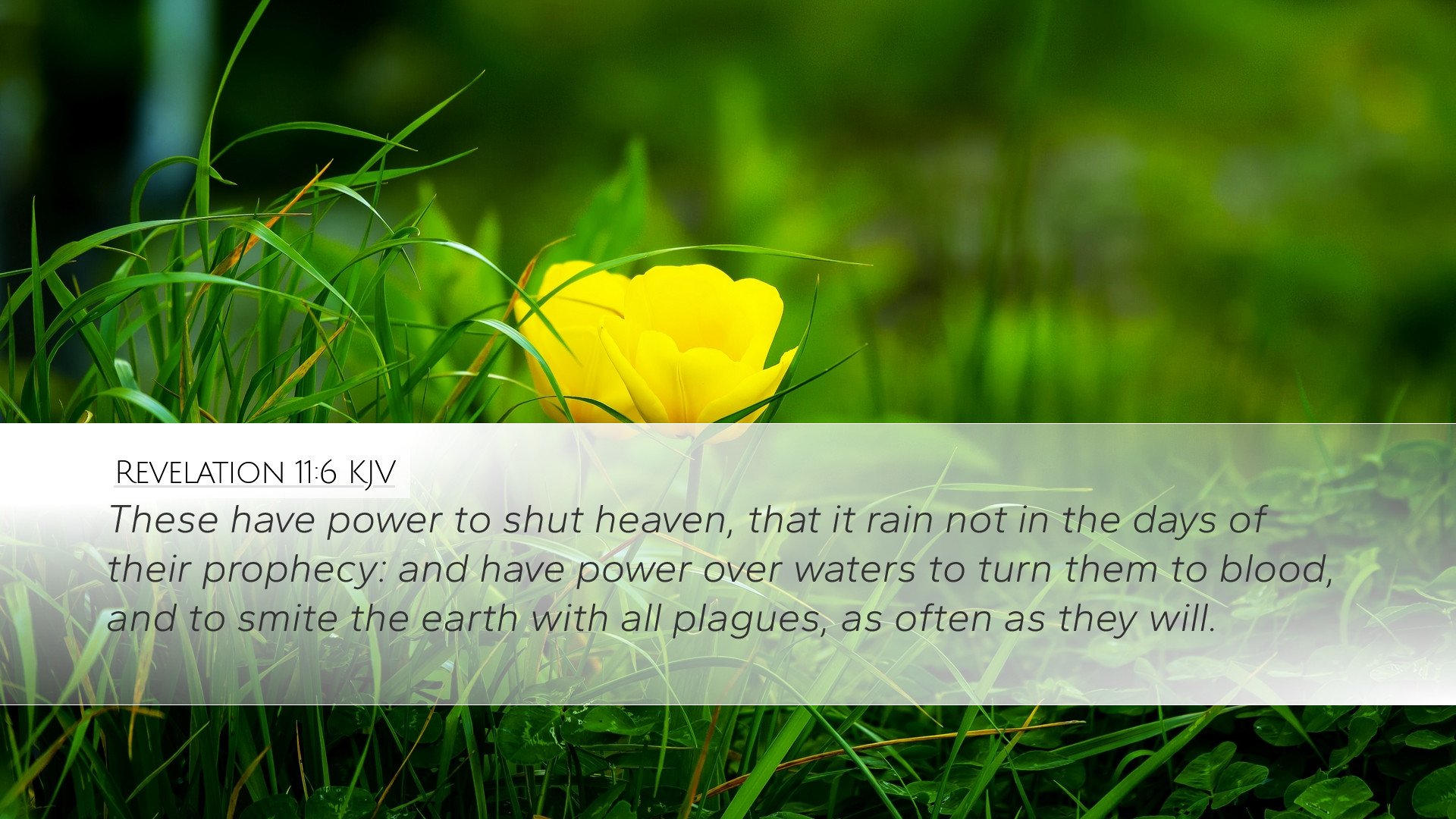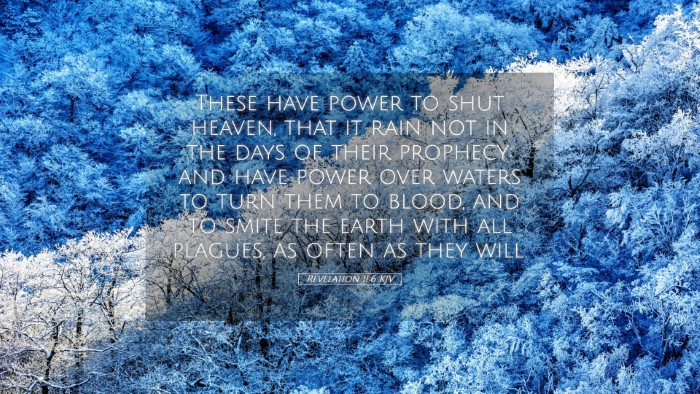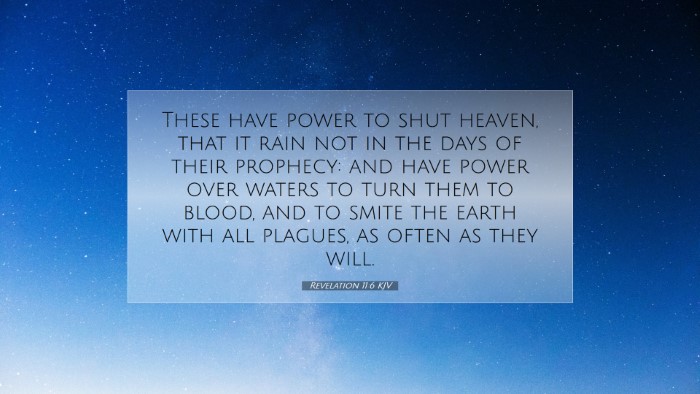Commentary on Revelation 11:6
Verse (Revelation 11:6): "These have power to shut heaven, that it rain not in the days of their prophecy: and have power over waters to turn them to blood, and to smite the earth with all plagues, as often as they will."
Introduction
This verse from Revelation describes the two witnesses and their divine authority to perform miraculous signs as a testament to their prophetic ministry. Scholars and commentators throughout history have provided rich insights into the significance of these powers, which echo the ministries of the Old Testament prophets, and serve as forewarnings of God's judgment.
Contextual Overview
The book of Revelation, penned by John, unfolds a vision of the end times, filled with symbols and prophetic imagery. Chapter 11 introduces the two witnesses, who are endowed with the authority to influence both nature and society in profound ways. This verse highlights their ability to bring drought and plagues, akin to the works of Moses and Elijah, suggesting a connection to Old Testament prophetic traditions.
Insights from Public Domain Commentaries
Matthew Henry's Commentary
Matthew Henry emphasizes that the two witnesses symbolize the true church and its ministry, proclaiming God's truth amidst opposition and apostasy. He notes that their ability to shut the heavens reflects God's judgment and the church's spiritual authority. This power serves as both a protection for the faithful and a warning to the unrepentant.
- The Power of Prayer: Henry points out that the ability to shut heaven recalls the prayers of Elijah (James 5:17), signifying the church’s power in intercession and its role in influencing public affairs through divine petition.
- Judgment and Mercy: The plagues mentioned indicate God's judgment upon a sinful world. Henry elucidates that while God’s judgments are severe, they are meant to lead to repentance, echoing the nature of God's dealings throughout Scripture.
Albert Barnes' Commentary
Albert Barnes provides an interpretation focusing on the literal and symbolic implications of the text. He regards the two witnesses as representatives of God's prophetic voice, empowered to enact divine sanctions upon the earth. The specific powers described highlight their role in communicating God’s seriousness regarding sin.
- Symbolism of the Powers: Barnes interprets the shutting of heaven as a symbol of spiritual famine and temptation, while turning water into blood suggests the purification of God’s people and the impending judgment on sin.
- The Importance of the Witnesses: He stresses that these witnesses highlight the importance of prophetic ministry in the face of rampant unbelief, serving as a testament to the faithfulness of God’s message through history.
Adam Clarke's Commentary
Adam Clarke analyzes the prophetic roles of the witnesses, commenting on their historical significance and their representation of God’s authority on earth. Clarke connects their powers to the broader narrative of judgment, noting that such manifestations are not arbitrary but serve specific purposes in God’s plan of redemption.
- Historical Reflections: Clarke draws comparisons to the prophets of old, suggesting that these witnesses embody the continuity of God's call to repentance throughout biblical history.
- Nature of the Miracles: He argues that the miracles performed signify the seriousness of the time period described in Revelation, emphasizing that these acts are both warnings and calls to repentance for the people.
Theological Significance
The powers granted to the two witnesses have profound theological implications. They illustrate God’s sovereignty and active role in human affairs, particularly in times of trial and tribulation. The ability to control nature serves to reaffirm His authority over creation and serves as a powerful proclamation of His impending judgment.
Implications for Pastors and Students
For pastors and students of theology, this passage serves as a reminder of the authority communicated through faithful ministry. The metaphorical powers of the witnesses challenge believers to consider their role in the present era as agents of God's truth, equipped with the responsibility to proclaim warnings of potential judgment and the call to repentance.
Application in Contemporary Context
In contemporary settings, the themes of this scripture resonate with the current societal climate, where moral relativism prevails. The message of the two witnesses urges the church to remain steadfast in its prophetic duty, proclaiming truth in love, calling people to accountability and pointing them toward grace and redemption found only in Christ.
Conclusion
Revelation 11:6 serves as a powerful testament to the ministry of the two witnesses, illustrating the gravity of their prophetic role in the unfolding narrative of human history. Drawing from the insights of respected commentators such as Matthew Henry, Albert Barnes, and Adam Clarke enriches our understanding of this scripture, encouraging a reflection on the intertwining of God’s judgment, mercy, and the church's role in proclaiming His truth.


